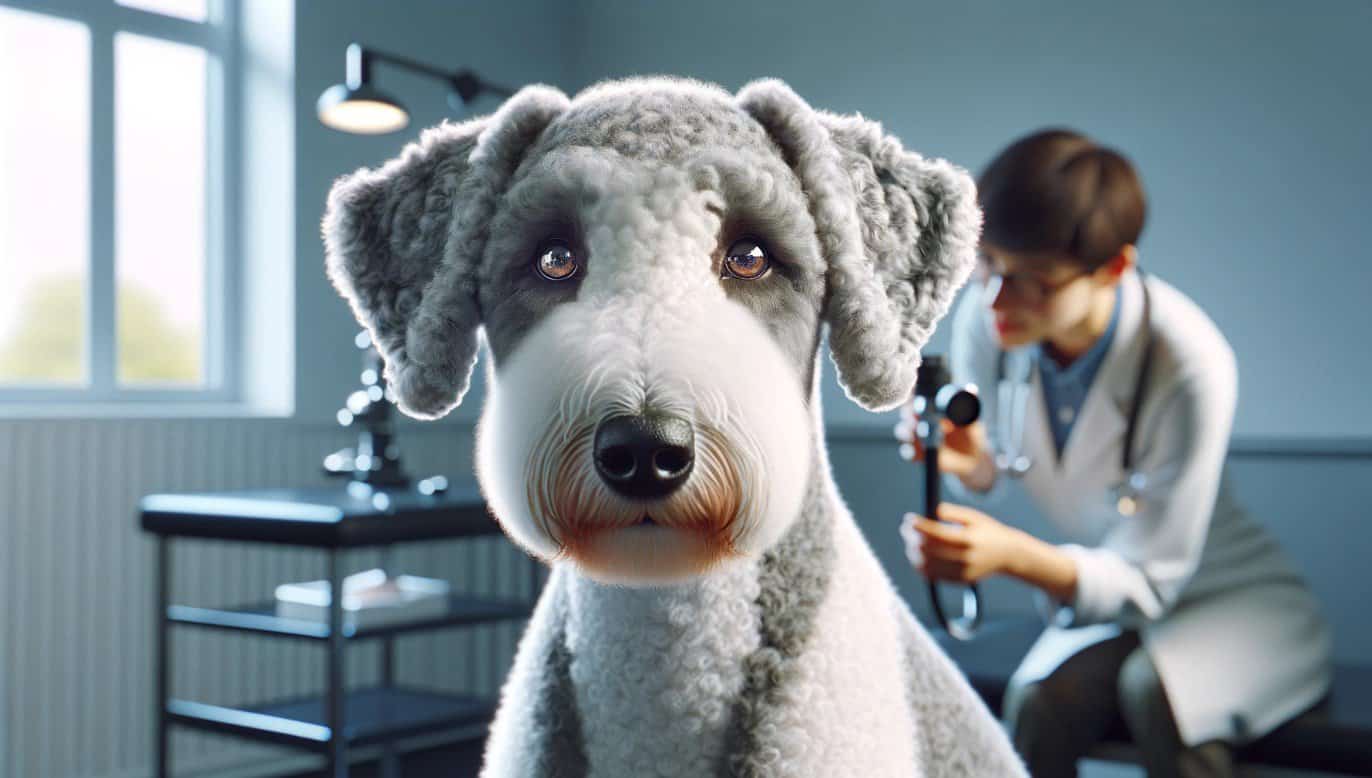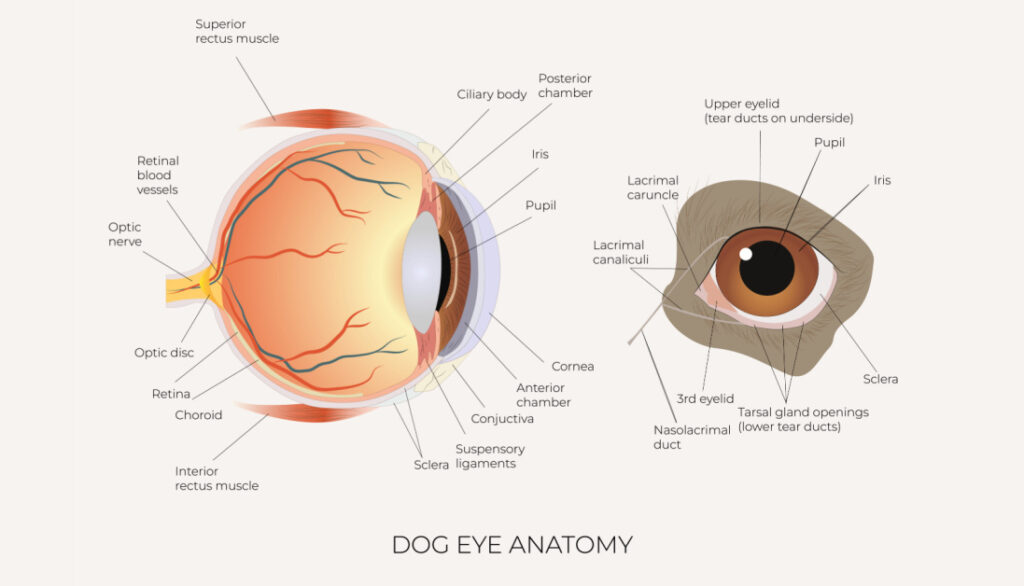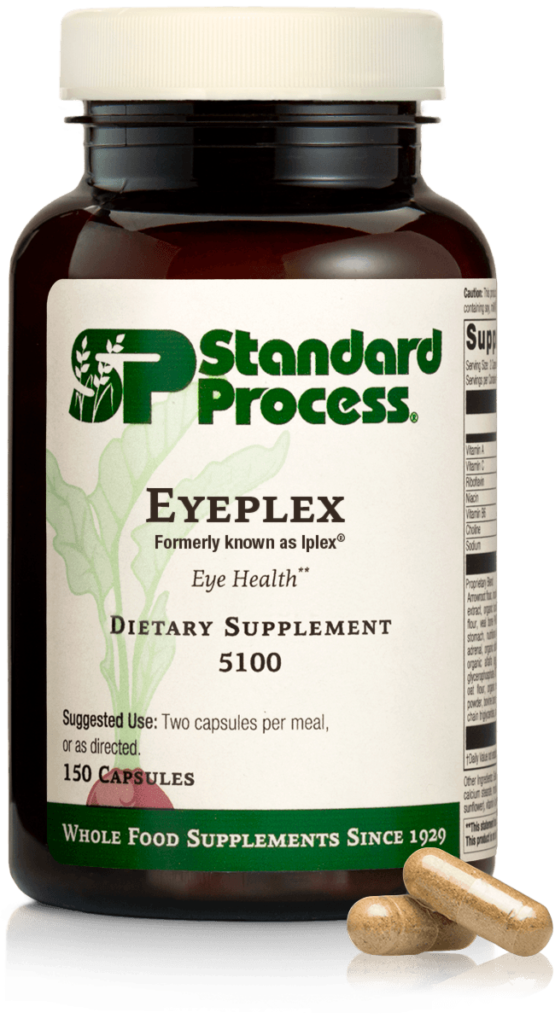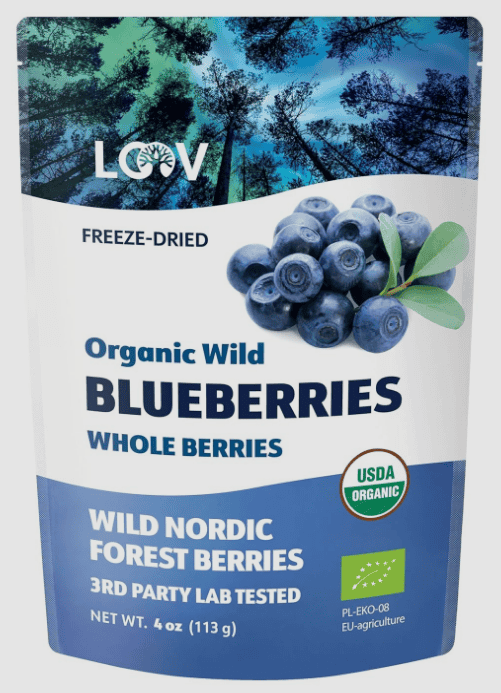Hi there, fellow dog parent! Today, we’re going to talk about a topic that’s very close to my heart – Bedlington Terrier Eye Health. As a holistic veterinarian, I’ve encountered many breeds and their unique health issues. But, the Bedlington Terrier, with its lamb-like appearance and lively personality, has a special place in my heart. However, like all breeds, they have their specific health concerns, and their eyes are no exception.
Bedlington Terriers are known for their distinctive almond-shaped eyes that sparkle with intelligence and curiosity. But, these beautiful eyes can be susceptible to various health issues. From common conditions like dry eyes and conjunctivitis to breed-specific issues like distichiasis, there’s a lot to consider when it comes to Bedlington Terrier eye care.

But don’t worry! With the right knowledge and a proactive approach, you can ensure your Bedlington Terrier’s eyes stay as bright and healthy as possible. From a holistic diet rich in Vitamin A and antioxidants to maintaining a clean environment and regular eye care, we’ll explore all the ways you can prevent and treat Bedlington Terrier eye problems. So, let’s get started and learn how we can keep those twinkling eyes of your furry friend in top-notch condition!
Understanding Breed Specific Eye Structure
As a holistic veterinarian, I understand that the unique physical attributes of your Bedlington Terrier greatly contribute to their charm. However, these distinct characteristics can sometimes bring about specific health issues. One such area is their eye health.
Bedlington Terriers, like many other dog breeds, have almond-shaped eyes which are somewhat small in proportion to their head. These eyes are set deep into their skull, protected by a prominent brow. The deep-set nature of their eyes means that they are more prone to eye injuries. Anything from a stray branch on a walk to an unexpected encounter with a cat can potentially cause harm. Bedlington Terriers are also predisposed to a number of breed-specific eye conditions, such as Distichiasis, where an abnormal growth of eyelashes occurs on the inner or outer edge of the eyelid, causing discomfort and potentially damaging the cornea.
Furthermore, their almond-shaped eyes have a tendency to become dry, which can lead to a condition known as Keratoconjunctivitis Sicca (KCS), or dry eye. This can cause discomfort and may lead to more serious problems if left untreated.
It’s also worth noting that the Bedlington Terrier’s eyes are relatively large compared to their tear ducts, which can lead to conditions like Epiphora, a condition where tears overflow from the eyes and can cause skin irritation or infection.
Understanding these unique aspects of your Bedlington Terrier’s eye structure allows you to be better prepared for potential health issues. It’s a key step in ensuring your furry friend maintains optimal eye health, and can enjoy their life to the fullest, free from discomfort and potential vision problems. Remember, early detection and prevention are key, so regular vet check-ups are vital for your Bedlington Terrier’s eye health.

Common Eye Issues In Bedlington Terrier
As a veterinarian, it’s important for me to inform you about common eye issues that can affect your Bedlington Terrier’s eye health. These dogs, with their unique eye structure, are prone to specific eye conditions that need special attention. Let’s delve into these issues to better understand them.
Firstly, Distichiasis is a common issue in Bedlington Terriers. This condition occurs when an extra row of eyelashes grow on the inner surface of the eyelid, causing irritation to the eye. While some dogs may not show any signs, others may experience discomfort, excessive blinking, or even corneal ulcers.
Another common issue is Progressive Retinal Atrophy (PRA). PRA is a group of genetic diseases that cause the retina to degenerate slowly over time, leading to eventual blindness. Early signs include night blindness and dilated pupils. Unfortunately, there is no cure for PRA, but early diagnosis can help manage the condition.
- Cataracts are also a concern for Bedlington Terrier eye health. These occur when the lens of the eye becomes cloudy, hindering vision. Cataracts can be surgically removed, improving your dog’s quality of life.
- Entropion is another condition that affects Bedlington Terriers. This is when the eyelids roll inward, causing the lashes to rub against the cornea, leading to irritation and potential vision loss. Surgery is often required to correct this issue.
Lastly, Corneal Dystrophy is a genetic disease that affects the cornea’s outermost layer, causing it to become opaque. This condition can lead to vision problems and may require medication or surgery.
| Eye Condition | Symptoms | Treatment |
|---|---|---|
| Distichiasis | Discomfort, excessive blinking, corneal ulcers | Surgical removal of extra eyelashes |
| Progressive Retinal Atrophy | Night blindness, dilated pupils | No cure, but early diagnosis can help manage the condition |
| Cataracts | Cloudy lens, hindered vision | Surgery |
| Entropion | Eyelids roll inward, irritation, potential vision loss | Surgery |
| Corneal Dystrophy | Opaque cornea, vision problems | Medication or surgery |
Remember, maintaining your Bedlington Terrier’s eye health is crucial. Regular vet check-ups can help identify these conditions early, leading to better management and treatment outcomes.

Prevention of Eye Problems
Ensuring your Bedlington Terrier gets the right nutrients for optimal eye health is essential for maintaining clear vision and preventing age-related issues. Natural, nutrient-rich foods and supplements can play a key role in supporting their eyesight. From vitamin A-packed freeze-dried liver treats to antioxidant-rich blueberries and targeted supplements like Eyeplex by Standard Process, there are several ways to nourish your dog’s eyes. In this section, we’ll explore how these powerful ingredients contribute to long-term vision health and overall well-being.
Eyeplex by Standard Process
Eyeplex by Standard Process is a specialized supplement designed to support your Bedlington Terrier’s eye health with a blend of essential nutrients. Formulated with key vitamins, minerals, and antioxidants, Eyeplex helps protect against oxidative stress, supports retinal function, and promotes overall vision health. Ingredients like vitamin A, vitamin C, and zinc contribute to maintaining strong eyesight, while whole food ingredients provide additional phytonutrients for cellular protection. Adding Eyeplex to your Bedlington Terrier’s diet can be especially beneficial for aging dogs or breeds prone to eye conditions, offering targeted nutritional support to keep their vision sharp and healthy for years to come.

Freeze-Dried Blueberries
Freeze-dried blueberries are a powerhouse of antioxidants that can help protect your Bedlington Terrier’s eyes from oxidative stress and age-related damage. Rich in vitamins C and E, as well as anthocyanins, these tiny but mighty berries help combat free radicals that can contribute to eye diseases like cataracts and macular degeneration. Incorporating freeze-dried blueberries into your dog’s diet provides a natural and delicious way to support retinal health, reduce inflammation, and promote overall vision longevity. Plus, they’re a low-calorie, dog-friendly treat that makes a great addition to a balanced diet for long-term eye health.

Freeze-Dried Liver
Freeze-dried liver treats are an excellent natural source of vitamin A, an essential nutrient for your Bedlington Terrier’s eye health. Vitamin A plays a crucial role in maintaining good vision, especially in low-light conditions, while also supporting overall immune function and skin health. Since liver is rich in bioavailable vitamin A, incorporating freeze-dried liver treats into your dog’s diet provides a convenient and nutritious way to promote optimal eye function. Just be sure to feed them in moderation, as excessive vitamin A can lead to toxicity. Adding these nutrient-packed treats to your pup’s routine is a simple, tasty way to support their long-term vision and well-being!

By prioritizing your Bedlington Terrier’s eye health through a balanced diet and nutritional supplements, you can help prevent many common eye issues. These simple steps can go a long way in ensuring your pup’s eyes stay healthy and clear for years to come.
Remember, it’s always best to consult with your vet before making any significant changes to your pet’s diet or adding supplements. They can guide you on the right dietary approach and supplements based on your Bedlington Terrier’s specific needs and overall health.
Environmental Hygiene To Reduce Eye Problems
Keeping your Bedlington Terrier’s environment clean and hygienic is a crucial step in maintaining their eye health. Here are some tips to help you achieve this:
Indoor Air Quality
Indoor air quality has a significant impact on your Bedlington Terrier’s eye health. Dust, allergens, and airborne irritants can cause eye irritation, leading to itching, redness, and even infections. To ensure optimal indoor air quality:
- Regularly clean and vacuum your home to reduce dust and allergens.
- Avoid smoking indoors as it can significantly irritate your dog’s eyes.
- Consider using an air purifier to filter out potential eye irritants.
Sprays, Diffusers, Candles, Incense
Many household items such as sprays, diffusers, candles, and incense can cause eye irritation in Bedlington Terriers. These products often contain chemicals and fragrances that can irritate your dog’s eyes if they come into contact with them. To prevent this:
- Use these products sparingly and always ensure your dog is in a different room when you’re using them.
- Opt for unscented products or those with natural ingredients.
- Keep these items out of your dog’s reach to prevent accidental contact.
Remember, your Bedlington Terrier’s eye health is not just about regular check-ups and treatments. It’s also about creating a safe and clean environment for them to thrive in. By taking these precautions, you can significantly reduce the risk of eye problems in your Bedlington Terrier.

Routine Bedlington Terrier Eye Care and Maintenance
As a responsible Bedlington Terrier parent, it’s vital to prioritize your dog’s eye health. Regular eye care and maintenance can help prevent common eye diseases in Bedlington Terriers and ensure your furry friend is comfortable and happy.
Daily and Weekly Care and Maintenance
Every day, take a few minutes to inspect your Bedlington Terrier’s eyes. They should be clear, bright, and free of discharge. If you notice any redness, swelling, or cloudiness, it’s time to visit the vet.
Use a soft, damp cloth to gently remove any crust or discharge from the corners of your dog’s eyes. Make sure to use a separate cloth for each eye to avoid spreading any potential infections.
Weekly, consider using a vet-approved eye wash or tear stain remover to keep your Bedlington Terrier’s eyes clean and clear. Also, check for any changes in your dog’s vision by observing their behavior and reactions to stimuli.
Monitor Hair Length, Nail Length, Bath Frequency
Bedlington Terriers are known for their curly, woolly coats. While adorable, their hair can sometimes grow too long and irritate their eyes. Regular grooming is essential to prevent hair from scratching the eye surface. Trim the hair around your dog’s eyes carefully using blunt-nose scissors or take your dog to a professional groomer.
Long nails can also be a risk factor for eye injuries if your dog scratches their face. Regular nail trims can help prevent such accidents. Remember to use a dog-specific nail clipper and be careful not to cut into the quick.
Bathing your Bedlington Terrier regularly is also important for eye health. Bathing helps to remove allergens, dirt, and dust that could irritate your dog’s eyes. However, avoid getting soap or shampoo in your dog’s eyes during baths. If possible, use a tear-free dog shampoo.
Remember, Bedlington Terrier eye health is a crucial aspect of their overall wellbeing. Regular eye care and maintenance can make a significant difference in preventing eye diseases and ensuring your furry friend’s eyes are as healthy as possible. If you ever notice anything unusual about your dog’s eyes, don’t hesitate to seek veterinary advice. Your Bedlington Terrier’s eyes are precious – keep them sparkling!
Frequently Asked Questions
1. What are common eye health conditions in Bedlington Terriers?
Bedlington Terriers are prone to several eye health conditions, including:
- Cataracts
- Progressive Retinal Atrophy (PRA)
- Entropion
- Distichiasis
- Glaucoma
2. How can I identify if my Bedlington Terrier has an eye health problem?
Look out for the following signs that may indicate an eye health problem:
- Excessive tearing or discharge
- Redness or inflammation
- Cloudiness or opacity in the eyes
- Squinting or blinking excessively
- Visible changes in the shape or color of the eyes
3. What should I do if I suspect my Bedlington Terrier has an eye health issue?
If you notice any signs of eye health problems in your Bedlington Terrier, it is important to consult a veterinarian as soon as possible. They will be able to perform a thorough examination and provide appropriate treatment or recommendations.
4. Can eye health conditions in Bedlington Terriers be prevented?
While some eye health conditions may have a genetic component, there are steps you can take to minimize the risk:
- Regularly visit a veterinarian for comprehensive eye examinations
- Follow a proper grooming routine, including regular cleaning of the eyes
- Avoid breeding dogs with known eye health issues
- Provide a balanced diet and maintain overall good health
5. What are the treatment options for eye health conditions in Bedlington Terriers?
The treatment for eye health conditions in Bedlington Terriers depends on the specific condition and its severity. It may include medication, surgery, or other interventions recommended by a veterinarian. Early detection and intervention are crucial for better outcomes.
